|
|
|
|
|
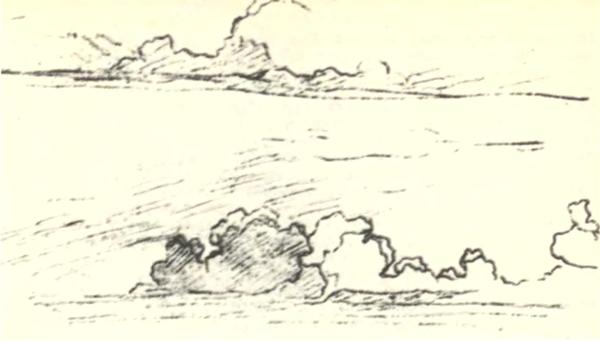
Taras Shevchenko. Clouds. Pencil. 1846-1850 (Хмари. Олівець. 1846-1850).
Taras Shevchenko
HAMALIYA
Translated by John Weir
FOREWORD
After the word comes the foreword; although it could have been done without. But, you see, here’s what: everything that I have seen in print - only seen, since I’ve not read very much - has a foreword, and I haven’t got one; if I weren’t printing my Haidamaki, there would be no need of a foreword either.
But once I’m sending them out into the world, they should have something to go with, so people shouldn’t jeer at the ragamuffins and say: "See what he’s like! Can it be that our grandfathers and fathers were more foolish than he, since they didn’t put out even a grammar textbook without a foreword?"
Yes, indeed, it’s so, I beg your pardon, a foreword is needed. But how should it be composed? - you know, that it shouldn’t contain falsehoods, nor should it contain the truth, but be the way all forewords are composed. Even though you kill me, I don’t know how to dd it; Fm ashamed to give praise, and I don’t want to disparage. But let us at last begin the beginning of this book: it is a pleasure to look on a blind kobzar as he sits there, sightless, with a boy, beside a hedge, and it is a pleasure to listen to him, as he sings a ballad about what took place long ago, how the Poles and Cossacks fought - it is a pleasure... and yet you’ll say: “Thank God that it’s past’’, the more so when you recall that we are one mother’s sons, that we are all Slavs. The heart is sore, but it must be told: let the sons and grandsons see that their parents erred, let them fraternize again with their enemies. May the Slavic land, covered with rye and with wheat as though with gold, remain forever without borders from sea unto sea. I am relating what happened in the Ukraine in 1768 the way I heard it from old people;
I haven’t read anything about it that has been printed and criticized because, it seems, there is nothing of the kind to read. Halaida is semi-invented, but the death of the Vilsnana churchwarden is true, because there are still people alive who knew him. Perhaps Gonta and Zaliznyak, the atamans of that bloody affair, are depicted by me not as they were - I do not guarantee that. My grandfather, may he stay hale, whenever he begins to relate something which he hadn’t seen himself, but heard from others, starts by saying: "If the old folks are lying, I’ll lie along with them."
(Taras Shevchenko)
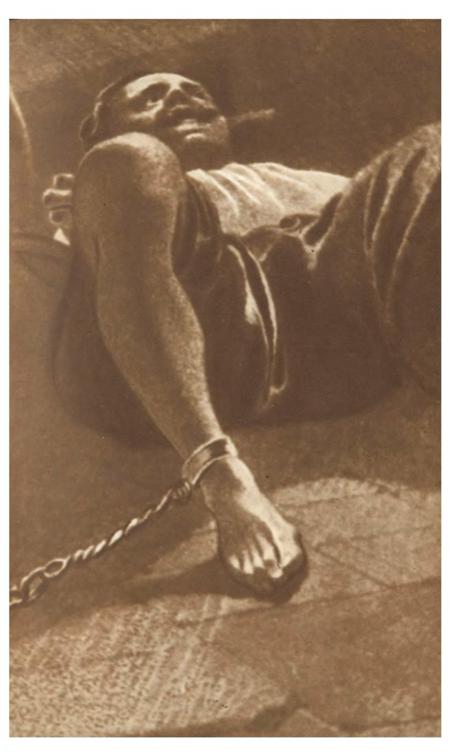
Taras Shevchenko. In Prison. Detail.
India ink and bister. 1856-1857.
|
|
HAMALIYA
"Oh, the winds are mute, the tides do not carry
Good tidings to us from Ukraine!
Do the Cossacks meet, the Turk plan to harry?
For news we are waiting in vain.
Blow, ye north wind, blow across the blue water
From Luh [31], from the fields of Ukraine,
Dry our bitter tears and drown our chains’ clatter,
And ease the poor prisoners’ pain.
Roll, oh roll, ye sea, as hither you’re bearing
The bold Cossacks’ boats from Ukraine,
When they sail to save their unhappy brethren
Who languish in Turkey in chains.
Even, O God, if they come not to free us,
Still send them across from Ukraine;
Word of their exploits will reach us in prison
And light our last days with their fame."
’Twas thus in Skutari that’ Cossacks were singing,
Unfortunate captives, their tears running free,
The tears ot the Cossacks, their woe overbrimming.
The Bosphorus shook, for it never before
Had heard Cossacks weeping; the grey bull in anguish
The hide on his back ’gan to shake with a roar
And sent the blue waves down his ribs with the message
Of Cossack misfortune full-speed to the sea.
The sea heard the tidings which Bosphorus bellowed
And passed the sore plaint on to Liman, which trembled
And told it in ripples to Dnieper's deep stream.
With foam upon his hoary whiskers,
Our might grand-dad thunder-roared:
“Hey, brother Luh, Khortitsya [32] sister!
D’ye hear? What are you waiting for!”
“We hear, we hear!” tney promptly answered.
The Dnieper soon with boats was thronged,
And Cossack voices rose in song:
“Ho, the Turk’s across the water
Where the surf is pounding.
Hey, hey! Pound, ye waves,
Wear the rocks all away!
Visitors are coming.
“Ho, the Turk has roomy pockets
Full of gold and silver.
Not for pelf do we sail.
But for the foe to assail,
Brethren to deliver.
“Ho, the Turkish janissaries,
Pasha, too, are snoring.
Ha, ho! Tremble, foe!
We’ll not temper the blow!
Liberty and glory!"
So, singing free, they set asea;
Oh the sea’s unruly.
In the lead boat Hamaliya
Steers his vessel truly.
Hamaliya, the heart falters:
The sea’s gone a-rocker!
They don’t take fright! —
Soon they’re hidden
By the surging water.
In luxury pillowed, Byzantium [33] drowses
At ease in his harem, Skutar’ at his side.
The Bosphorus clamours, intent on arousing
The Turk from his slumber, to thwart the surprise.
The sea roared in fury: "I swear that I’ll bury
You, Bosphorus Strait, beneath mountains of sand
Unless you are silent!... D’ye see whom I’m bearing
To visit the sultan?... Be still, I command!"
The Bosphorus quaked at the sea’s angry thunder
(The sea loved those resolute, long-whiskcered Slavs)
And stopped its commotion. And so the Turks
slumbered.
At ease in his harem the sultan relaxed.
Only in Skutari the captives weren’t sleeping
In their dreadful dungeon. For what do they wait?
God’s help in their trouble they are beseeching,
While waves on the outside keep pounding away.
"Do not permit, God of Ukraine,
That freedom-loving Cossacks perish
In foreign prisons, clad in chains!
A blot today, ’twill be black shame
If we, who liberty so cherish,
Will rise up from a foreign grave
On that, the final Judgement Day,
And face the hosts in shameful shackles...."
Then from behind the walls a cry
Rang through the night, "On, on to battle!
The Moslem pagans smite and slay!"
Oh, the very blood is blazing.
Skutari goes crazy.
"Kill them! Slay them!" Hamaliya
The fortress is razing.
The cannon of Skutari thundered,
And yet the Turks could not survive
The daring of the Cossack drive —
The janissary guards went under.
Hainaliya through Skutari —
Through Hades — is racing;
First into the prison breaking,
He knocks off the bracelets.
"Fly free, birds of falcon feather,
Join the merry-making!"
The grey falcons aroused themselves,
For long had they waited
To hear good Christian speech again.
The night, too, awakened;
Dear old mother, she had never
Seen how Cossacks settle
Accounts with foes. Have no terror,
Watch the Cossack revel.
Why should Cossacks feast in darkness
At a celebration! —
They’re not robbers that in the night
They should eat raw bacon
Without a fire. "Let us have light!"
Soon the clouds were scorching —
Skutari burned and the galleys
Were turned into torches.
Byzantium at last awoke
And beheld the slaughter,
Gnashing his teeth, to the rescue
He swam ’cross the water.
Byzantium in frenzy rages
And clutches madly at the shore,
Takes hold, rears up — then laved with gore,
Sinks down beneath the Cossack sabres.
Like hell-fire all Skutari blazes;
The Bosphorus is filled with blood
Which gushes from the market-places.
Like blackbirds flitting through a wood
The Cossacks comb the raging Hades
To see that none escape the sword!
Fire holds no terror for this brood.
They raze the fortress; then they carry
The gold and silver in their caps
Back to their boats. And now the task
Is done. There is no need to tarry.
The lads assembled at the shore.
Their pipes with burning brands they started,
Boarded their boats, took to the oars —
The crimson waves before them parted.
More like coming from an outing
Than from war returning,
With rousing songs, Cossack fashion
‘Cross the sea they journey:
"Our ataman Hamaliya
Is a chieftain daring,
His good crew he took acruising
Asea for an airing;
Asea for an airing,
Fame and fortune sharing,
Freeing brothers from the prison
Where they were despairing.
To Skutari Hamaliya
Boldly went afaring.
There our Cossack lads in irons
Sat for death preparing.
‘Brothers!’ called out Hamaliya,
The lads liberating,
‘Life awaits you, celebrating,
Turks exterminating,
Our Cossack camps with tapestries
And silks decorating!’
Swiftly came the Cossacks flying
The harvest to gather;
Stoutly reaping, corpses heaping,
They sang all together:
‘Glory to you, Hamaliya,
O’er Ukraine’s wide spaces,
O’er Ukraine’s wide spaces
Your name will be cherished
That you didn’t let the Cossacks
In slavery perish.’"
So sail the Cossacks home with song;
Behind, the doughty Hamaliya
Keeps watch — the eagle guards his young;
From Dardanelles the wind blows freely,
Yet not a sign of Turk flotilla;
The Turk’s afraid the Monk [34] again
May build a bonfire at Galata [35],
Or that a new Pidkova [36] wrathful
Will call to battle on the main.
Soon the morning sun, arising,
Crimson tints the dancing waves;
Stretching out to the horizon
Friendly seas embrace the brave.
Hamaliya, feel the breezes....
Our home seas are pounding!...
Then the Cossack boats are bidden
By billows like mountains.
|
|
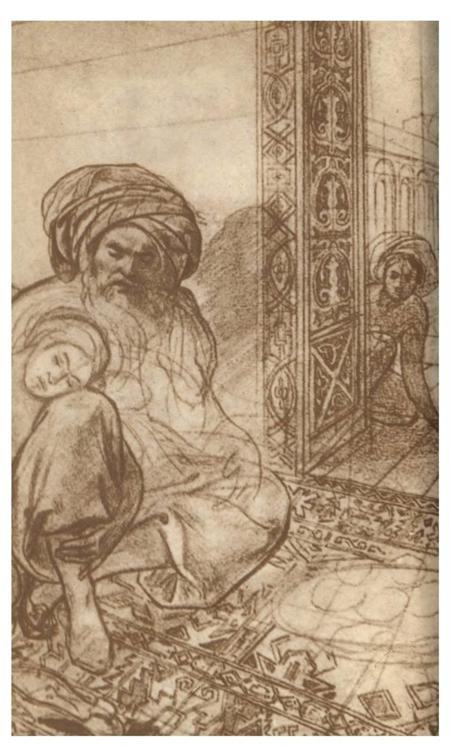
Taras Shevchenko. In a Harem.
Detail. Pencil. 1858.
Notes:
[31] Luh, Veliky Luh(The Great Meadow), the land near the mouth of the Dnieper River where the Zaporozhian Cossacks hunted and fished.
[32] Khortitsya, the island in the Dnieper where the Zaporozhian Sich was located.
[33] Byzantium, the Eastern Roman Empire. Here Istanbul, which before 1453 was the capital of Byzantium and whose name then was Constantinople.
[34] Monk, Hetman Petro Konashevich-Sahaidachny. He was not a monk, and died in 1622 of a wound received in battle.
[35] Galata, a suburb of Istanbul.
[36] Pidkova, Ivan Pidkova, one of the leaders in the struggle of the Moldavian and Ukrainian people against the Turkish and Tartar invaders and Moldavian feudals in the 16th c.
Taras Shevchenko
"Hamaliya" / "Oh, the winds are mute, the tides do not carry"
("Гамалія" / "Ой нема, нема ні вітру, ні хвилі")
[October - first half of November, 1842]
Translated by John Weir
Source:
Taras Shevchenko. Selected poetry. Kiev, "Dnipro", 1977, p. 114 - 122.
Original publication:
Taras Shevchenko. Zibrannia tvoriv: U 6 t. — K., 2003. — T. 1:
Poeziia 1837-1847. — S. 234 - 238.
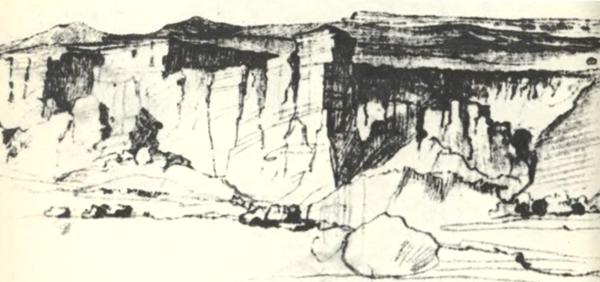
Taras Shevchenko. Aji-Bai. Detail. Pencil. 1848 (Аджи-Бай. фрагмент. Олівець. 1848 ).
Тарас Шевченко. Поема "Гамалія":
ПЕРЕДМОВА
По мові — передмова. Можна і без неї, так ось бачте що: все, що я бачив надрукованого, — тілько бачив, а прочитав дуже небагато,— всюди є передслово, а в мене нема. Якби я не друкував своїх «Гайдамаків», то воно б не треба і передмови. А коли вже пускаю в люди, то треба і з чим, щоб не сміялись на обірванців, щоб не сказали: «От який! хіба діди та батьки дурніші були, що не пускали в люди навіть граматики без предисловия». Так, далебі, так, вибачайте, треба предисловіє. Так як же його скомпоновать? щоб, знаєте, не було і кривди, щоб не було і правди, а так, як всі предисловія компонуються. Хоч убий, не вмію: треба б хвалить, так сором, а гудить не хочеться. Начнем же уже начало книги сице: весело подивиться на сліпого кобзаря, як він сидить собі з хлопцем, сліпий, під тином, і весело послухать його, як він заспіває думу про те, що давно діялось, як боролися ляхи з козаками; весело... а все-таки скажеш: «Слава богу, що минуло»,— а надто як згадаєш, що ми одної матері діти, що всі ми слав’яне. Серце болить, а розказувать треба: нехай бачать сини і внуки, що батьки їх помилялись, нехай братаються знову з своїми ворогами. Нехай житом-пшеницею, як золотом, покрита, нерозмежованою останеться навіки од моря і до моря — слав’янськая земля. Про те, що діялось на Україні 1768 року, розказую так, як чув од старих людей; надрукованого і критикованого нічого не читав, бо, здається, і нема нічого. Галайда вполовину видуманий, а смерть вільшанського титаря правдива, бо ще є люди, котрі його знали. Гонта і Залізняк, отамани того кровавого діла, може, виведені в мене не так, як вони були,— за це не ручаюсь. Дід мій, нехай здоров буде, коли зачина розказувать що-небудь таке, що не сам бачив, а чув, то спершу скаже: «Коли старі люди брешуть, то й я з ними».
(Тарас Шевченко)
|
ГАМАЛІЯ
«Ой нема, нема ні вітру, ні хвилі
Із нашої України!
Чи там раду радять, як на турка стати,
Не чуємо на чужині.
Ой повій, повій, вітре, через море
Та з Великого Лугу,
Суши наші сльози, заглуши кайдани,
Розвій нашу тугу.
Ой заграй, заграй, синесеньке море,
Та під тими байдаками,
Що пливуть козаки, тілько мріють шапки,
Та на сей бік за нами.
Ой Боже наш, Боже, хоч і не за нами,
Неси Ти їх з України.
Почуємо славу, козацькую славу,
Почуємо та й загинем».
Отак у Скутарі козаки співали,
Співали, сердеги, а сльози лились,
Лилися козацькі, тугу домовляли.
Босфор аж затрясся, бо зроду не чув
Козацького плачу, застогнав широкий
І шкурою, сірий бугай, стрепенув,
І хвилю, ревучи, далеко-далеко
У синєє море на ребрах послав.
І море ревнуло Босфорову мову,
У Лиман погнало, а Лиман Дніпрові
Тую журбу-мову на хвилі подав.
Зареготався дід наш дужий,
Аж піна з уса потекла.
«Чи спиш, чи чуєш, брате Луже?
Хортице-сестро?»
Загула
Хортиця з Лугом: «Чую, чую!»
І Дніпр укрили байдаки,
І заспівали козаки:
«У туркені, по тім боці,
Хата на помості.
Гай, гай! Море, грай,
Реви, скелі ламай!
Поїдемо в гості.
У туркені у кишені
Таляри, дукати.
Не кишені трусить,
Їдем різать, палить,
Братів визволяти.
У туркені яничари
І баша на лаві.
Гой-ги, вороги!
Ми не маєм ваги!
Наша воля й слава!»
Пливуть собі, співаючи,
Море вітер чує.
Попереду Гамалія
Байдаком керує.
Гамалію, серце мліє:
Сказилося море,
Не злякає! І сховались
За хвилі — за гори.
Дрімає в харемі — в раю Візантія.
І Скутар дрімає; Босфор клекотить,
Неначе скажений; то стогне, то виє:
Йому Візантію хочеться збудить.
«Не буди, Босфоре: буде тобі горе;
Твої білі ребра піском занесу,
У мул поховаю! — реве синє море. —
Хіба ти не знаєш, яких я несу
Гостей до султана?»
Так море спиняло
(Любило завзятих чубатих слав’ян).
Босфор схаменувся. Туркеня дрімала.
Дрімав у харемі ледачий султан.
Тілько у Скутарі, в склепу, не дрімають
Козаки-сердеги. Чого вони ждуть?
По-своєму Бога в кайданах благають,
А хвилі на той бік ідуть та ревуть.
«О милий Боже України!
Не дай пропасти на чужині,
В неволі вольним козакам!
І сором тут, і сором там —
Вставать з чужої домовини,
На суд Твій праведний прийти,
В залізах руки принести,
І перед всіми у кайданах
Стать козакові...»
«Ріж і бий!
Мордуй невіру-бусурмана!» —
Кричать за муром. Хто такий?
Гамалію, серце мліє:
Скутар скаженіє!
«Ріжте! бийте!» — на фортеці
Кричить Гамалія.
Реве гарматами Скутара,
Ревуть, лютують вороги,
Козацтво преться без ваги —
І покотились яничари.
Гамалія по Скутарі —
По пеклу гуляє,
Сам хурдигу розбиває,
Кайдани ламає.
«Вилітайте, сірі птахи,
На базар до паю!»
Стрепенулись соколята,
Бо давно не чули
Хрещеної тії мови.
І ніч стрепенулась:
Не бачила стара мати
Козацької плати.
Не лякайся, подивися
На бенкет козачий.
Темно всюди, як у будень,
А свято чимале.
Не злодії з Гамалієм
Їдять мовчки сало
Без шашлика. «Засвітимо!»
До самої хмари
З щоглистими кораблями
Палає Скутара.
Візантія пробуркалась,
Витріщає очі,
Переплива на помогу,
Зубами скрегоче.
Реве, лютує Візантія,
Руками берег достає;
Достала, зикнула, встає —
І на ножах в крові німіє.
Скутар, мов пекло те, палає,
Через базари кров тече,
Босфор широкий доливає.
Неначе птахи чорні в гаї,
Козацтво сміливе літає.
Ніхто на світі не втече!
Огонь запеклих не пече.
Руйнують мури, срібло, злото
Несуть шапками козаки
І насипають байдаки.
Горить Скутар, стиха робота,
І хлопці сходяться, зійшлись,
Люльки з пожару закурили,
На байдаки — та й потягли,
Рвучи червоні гори-хвилі.
Пливуть собі, ніби з дому,
Так, буцім гуляють,
Та, звичайне запорожці,
Пливучи співають:
«Наш отаман Гамалія,
Отаман завзятий,
Забрав хлопців та й поїхав
По морю гуляти,
По морю гуляти,
Слави добувати,
Із турецької неволі
Братів визволяти.
Ой приїхав Гамалія
Аж у ту Скутару,
Сидять брати-запорожці,
Дожидають кари.
Ой як крикнув Гамалія:
«Брати, будем жити,
Будем жити, вино пити,
Яничара бити,
А курені килимами,
Оксамитом крити!»
Вилітали запорожці
На лан жито жати,
Жито жали, в копи клали,
Гуртом заспівали:
«Слава тобі, Гамаліє,
На весь світ великий,
На весь світ великий,
На всю Україну,
Що не дав ти товариству
Згинуть на чужині!»
Пливуть співаючи; пливе
Позад завзятий Гамалія:
Орел орлят мов стереже.
Із Дарданелів вітер віє,
А не женеться Візантія:
Вона боїться, щоб Чернець
Не засвітив Галату знову
Або гетьман Іван Підкова
Не кликнув в море на ралець.
Пливуть собі, а з-за хвилі
Сонце хвилю червонить,
Перед ними море миле
Гомонить і клекотить.
Гамаліє, вітер віє...
Ось-ось наше море!..
І сховалися за хвилі —
За рожеві гори.
|
|
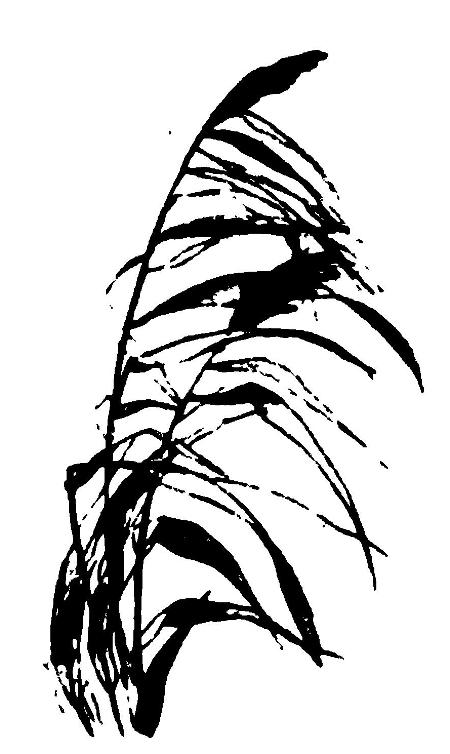
Taras Shevchenko. Bulrushes. Pencil. 1856 (Очерет. Олівець. 1856).
Illustrations:
1. Taras Shevchenko. Clouds. Pencil. 1846-1850 (Хмари. Олівець. 1846-1850).
2. Taras Shevchenko. In Prison. Detail. India ink and bister. 1856-1857 (У в’язниці, фрагмент. Туш, бістр. 1856-1857).
3. Taras Shevchenko. In a Harem. Detail. Pencil. 1858 (В гаремі, фрагмент. Олівець, 1858).
4. Taras Shevchenko. Aji-Bai. Detail. Pencil. 1848 (Аджи-Бай. фрагмент. Олівець. 1848 ).
5. Taras Shevchenko. Bulrushes. Pencil. 1856 (Очерет. Олівець. 1856).

More Taras Shevchenko's poems translated from Ukrainian into English by John Weir:
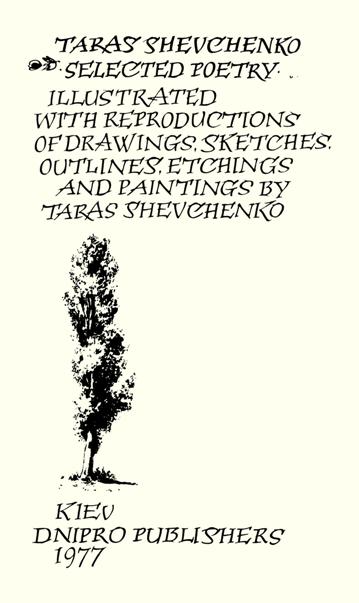 John Weir (Ivan Fedorovych Viv'yurskiy), a Canadian of the Ukrainian lineage, was a talented English-speaking translator of the second half of the 19ih century. During his life he translated 29 Shevchenko's poetic works, a prosaic foreword to the poem of «The Haidamaky», the narrative «The Artist», the poet’s autobiographic letter and some excerpts from his diary. John Weir, being a translator with the Ukrainian root, felt melodiousness of Shevchenko’s lines, understood a social foundation of the poet's artistic images. John Weir (Ivan Fedorovych Viv'yurskiy), a Canadian of the Ukrainian lineage, was a talented English-speaking translator of the second half of the 19ih century. During his life he translated 29 Shevchenko's poetic works, a prosaic foreword to the poem of «The Haidamaky», the narrative «The Artist», the poet’s autobiographic letter and some excerpts from his diary. John Weir, being a translator with the Ukrainian root, felt melodiousness of Shevchenko’s lines, understood a social foundation of the poet's artistic images.
Споріднені публікації, за тегами:
|
|
|
|
|
|






